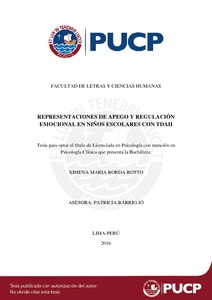Representaciones de apego y regulación emocional en niños escolares con TDAH
Abstract
La presente investigación tiene como objetivo explorar la relación entre las representaciones de apego y las estrategias de regulación emocional en niños escolares diagnosticados con TDAH. Para ello se contó con la participación de 20 niños/as con diagnóstico de TDAH, entre los 6 y 12 años (M = 7.84, DE = 1.61), quienes acuden a un centro de desarrollo terapeútico. Además, se tuvo la colaboración de los cuidadores, cuyas edades oscilan entre los 28 y 46 años (M = 37.88, DE = 4.40) en el caso de la madre y entre los 32 y 58 años (M = 40.88, DE = 6.50) para el padre. Los niños completaron el Attachment Style Classification Questionnaire (ASCQ), y los cuidadores respondieron el Emotion Regulation Checklist (ERC). Los resultados reflejaron que los niños reportan un apego ambivalente en un nivel medio, mostrando cierto temor a no ser aceptados por otros niños, aunque un interés por estar en constante interacción con ellos. Además, los cuidadores perciben que sus hijos poseen un adecuado nivel de regulación emocional, en lo referente a sus emociones positivas; no obstante consideran que presentan algunas dificultades para regular la expresión de sus emociones negativas. A pesar de no encontrar relación entre ambos constructos, esta investigación busca ser el punto de partida para continuar estudiando las relaciones entre estas variables. This research aims to explore the relationship between attachment representations and emotion regulation in school children with ADHD. To achieve this purpose, 20 children with ADHD between 6 and 12 years old (M = 7.84, SD = 1.61) who attend a center of therapeutic development participated in the study. As well, we count with the collaboration of the caregivers, whose age oscillate between 28 and 46 (M = 37.88, SD = 4.40) for the mother, and between 32 and 58 (M = 40.88, SD = 6.50) for the father. The children complete the Attachment Style Classification Questionnaire (ASCQ) and the caregivers fill out the Emotion Regulation Cheklist (ERC). The results reflect that the children reveal a middle level of ambivalent attachment, demonstrating certain fear of not being accepted by other kids, although an interest for being in constant interaction with them. Additionally, the caregivers perceive that their children have an appropriate level of emotion regulation, being able to regulate their positive emotions; however, they consider the presence of difficulties when the children have to regulate the expression of negative emotions. Although we didn´t find a relationship between both constructs, this research looks forward to be the commence of future studies, in order to obtain more information of this variables.
Temas
Psicología infantil.
Apego.
Emociones infantiles.
Trastorno por déficit de atención e hiperactividad.
Apego.
Emociones infantiles.
Trastorno por déficit de atención e hiperactividad.
Para optar el título de
Licenciado en Psicología Clínica





